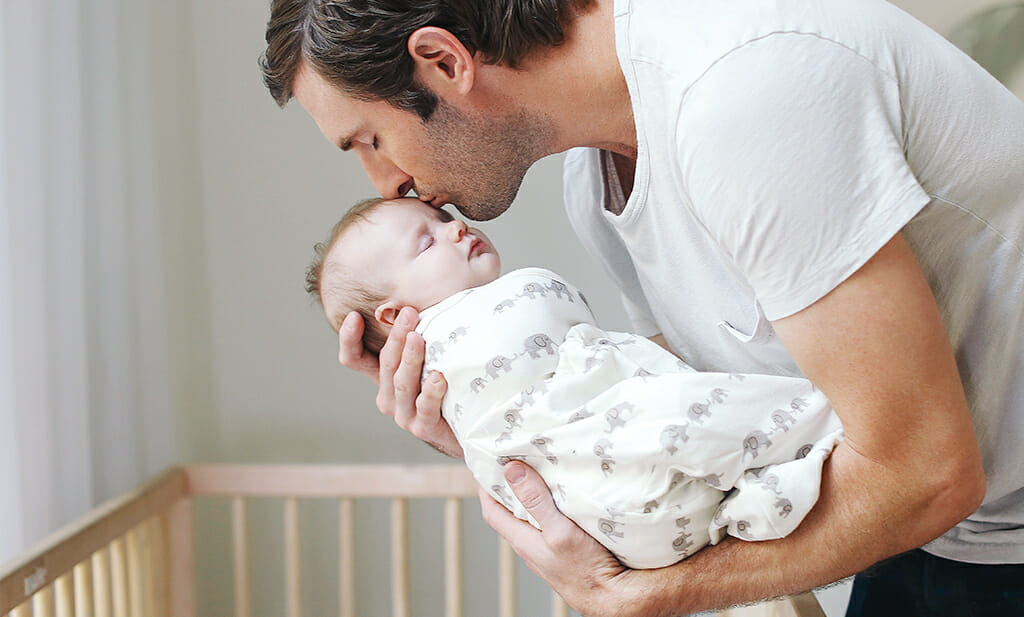
Infant sleep
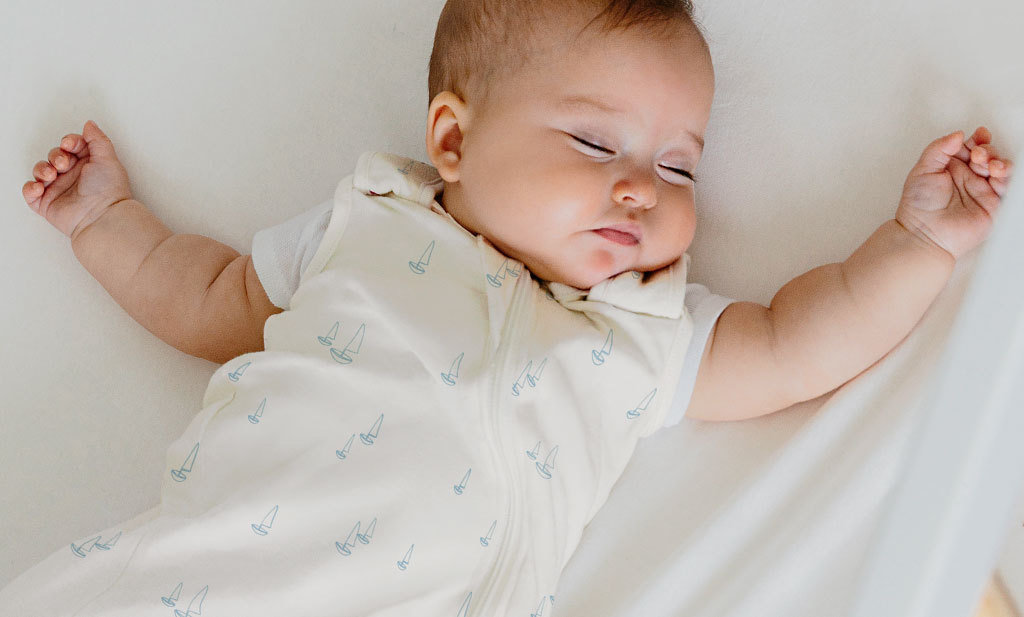
Do you find yourself staring at your new baby sleeping and wondering “how much sleep does my baby need?”
Our UK sleep specialist Gemma Coe is a mum of two herself and is a certified baby and child sleep consultant. She helps families all over the world develop healthy sleep habits. Today, Gemma takes us through some advice around how much sleep your baby needs depending on their age.
Until your child reaches three years of age, in a 24 hour period, they should be spending more time asleep than awake!
Remember, the totals and hours quoted throughout this blog are just guides. They help make sure your baby is getting enough sleep for normal development.
Your baby may fall asleep outside these windows and may need more or less sleep than quoted. Babies’ sleep needs are completely individual and are affected by development, environment and growth. Just like every other aspect of caring for our babies, we learn their needs alongside them.
Newborns (0-3 Months Old)
The first thing to mention about infant sleep is that it’s highly variable and this is completely normal in terms of normal sleep development.
Please don’t worry about introducing a set ‘by the clock’ routine at this stage for your newborn baby. Their body clock and circadian rhythm just isn’t established yet. 10 minute naps will be common as well as naps lasting hours at a time! Sleep patterns can be very irregular.
Most newborn babies will continue to wake multiple times at night for feeds and comfort and the boundary between day and night isn’t clear. It’s common for babies to have night and day confusion and no set pattern at all. As a result, bedtime may be very late, or even feel like it doesn’t quite happen at all!
What to expect: 15-17 hours total sleep in a 24 hour period, multiple naps, 30-90 minute wake windows, multiple night feeds.

How much sleep does my 3 month old need?
Many babies will have started to ‘wake to the world’ now they’re out of those really early weeks. However, sleep remains highly variable at this age but typically they will take around 5 naps in the day.
At around 12 weeks we welcome the production of their own melatonin. This will help with feeling sleepy at bedtime and you can start to see some consistency and longer stretches of your baby’s sleep at night. You may want to start experimenting with simple steps of a bedtime routine e.g. a certain song, using a sleeping bag etc. to introduce some good healthy sleep habits and sleep cues.
What to expect: 14-16 hours in a 24 hour period, 4-5 naps, 60-90 minute wake windows, multiple night feeds.
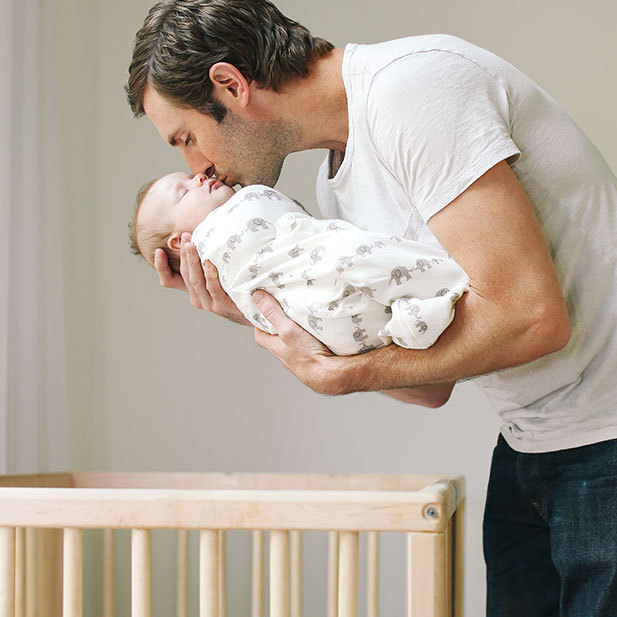
Sleep requirements at 4 to 5 months old
The 4 month regression hits! Sleep cycles start to develop. Typically this is characterised by a change in sleep patterns and trouble sleeping. Sleep now moves through a more distinct sleep cycle with several stages. This can introduce new sleep problems with disturbed nights and possibly frequent re-settles. Not all babies will be as affected by the regression and some babies will start sleeping longer stretches.
What to expect: 14-16 hours a day, 3-4 naps, 1.5-2.5 hour wake windows, night feeds, more distinct daytime ‘pattern’.
How much sleep does my 5-7 month old need?
Typically we’ll start to see the transition from 4 to 3 naps a day. Some babies will be sleeping longer stretches at night with one or two feeds (depending on development). Other babies will start sleeping through the night. The daytime schedule becomes far more predictable and naps may start to become more reliable. At least one nap of the day may lengthen.
Your baby may start to need less help to fall asleep and stay asleep, and may start to be able to settle and get back to sleep if they wake at night and don’t feeding or changing.
What to expect: 14-15 hours a day, 3-4 naps, 2-3 hour wake windows, fewer night feeds, distinct daytime ‘pattern’.
What happens to sleep at 7-9 months of age?
Commonly we’ll see changes to sleep at night characterised by an 8 month regression. Usually babies are going through a big developmental growth period. Separation anxiety can also creep in and this can affect night sleep.
There’s also teeth! Argh. Teeth.
You’ll also probably find the last nap of the day is dropped and they’ll transition to a clearer 2 nap schedule with a morning and early afternoon nap. They may need an earlier bedtime when making this transition.
Babies may be able to go through the night without a night feed (still highly variable and dependent on many factors).
What to expect: 14-15 hours in a 24 hour period, 2-3 naps, 2.5-3.5 hour wake windows, less night feeds, distinct daytime ‘pattern’.
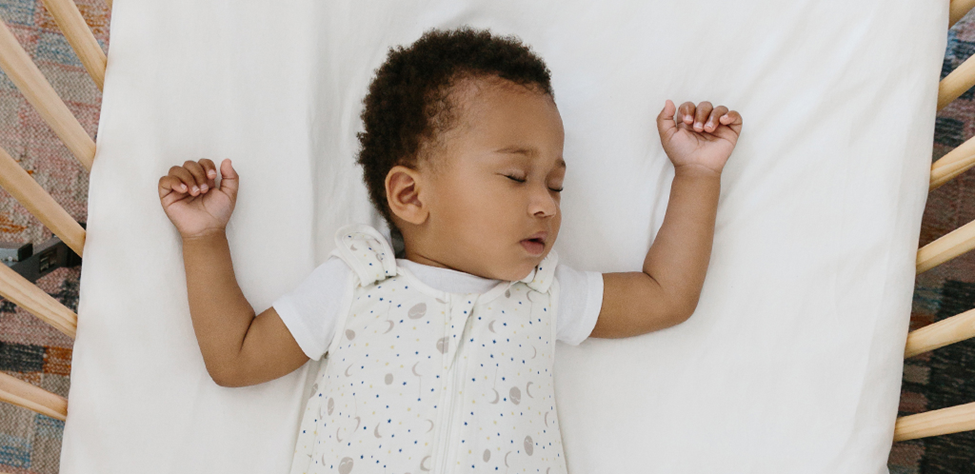
At 9-15 months, transition to toddlerhood
A brief window of stability on a 2 nap day schedule! Sometimes children may look ready to drop their first nap around 12 months of age, but it’s more likely to be a bit of a separation anxiety phase and some acute FOMO! Obviously they’d much rather be playing than napping.
Most children are better set to dropping the first nap of the day from 15 months onwards.
Most children will be able to sleep for much longer stretches at night and sleeping though the night (or long periods) is possible for many parents to aim for.
This is a huge period of growth and development and you may notice them practicing their skills in the middle of the night!
What to expect: 13-14 hours in a 24 hour period, 2 naps, 3-4 hour wake windows.
Older toddlers: 15-18 months-2.5 years
Another period of change where your little toddler is highly likely to transition to one long nap in the middle of their day. With any change there may be a period of instability. Bring bedtime earlier if they’re struggling with the longer wake windows.
What to expect: 12-14 hours in a 24 hour period, 1 nap, 5-6 hour wake windows.
Sleep requirements for 3 to 5 year olds. The pre-school years.
Most toddlers will be able to drop their lunchtime nap around the age of 3. Some will need a nap for a little longer and some will be ready to drop it sooner.
For older children, replace the nap with some quiet time to allow the opportunity to rest and recover. Early bedtime will help make this transition a little easier and avoid overtiredness during the bedtime routine.
What to expect: 10.5-13 hours in a 24 hour period, 0-1 naps, 6-12 hour wake windows.
Here is a handy chart to guide you through each stages of your little ones sleep depending on their age.
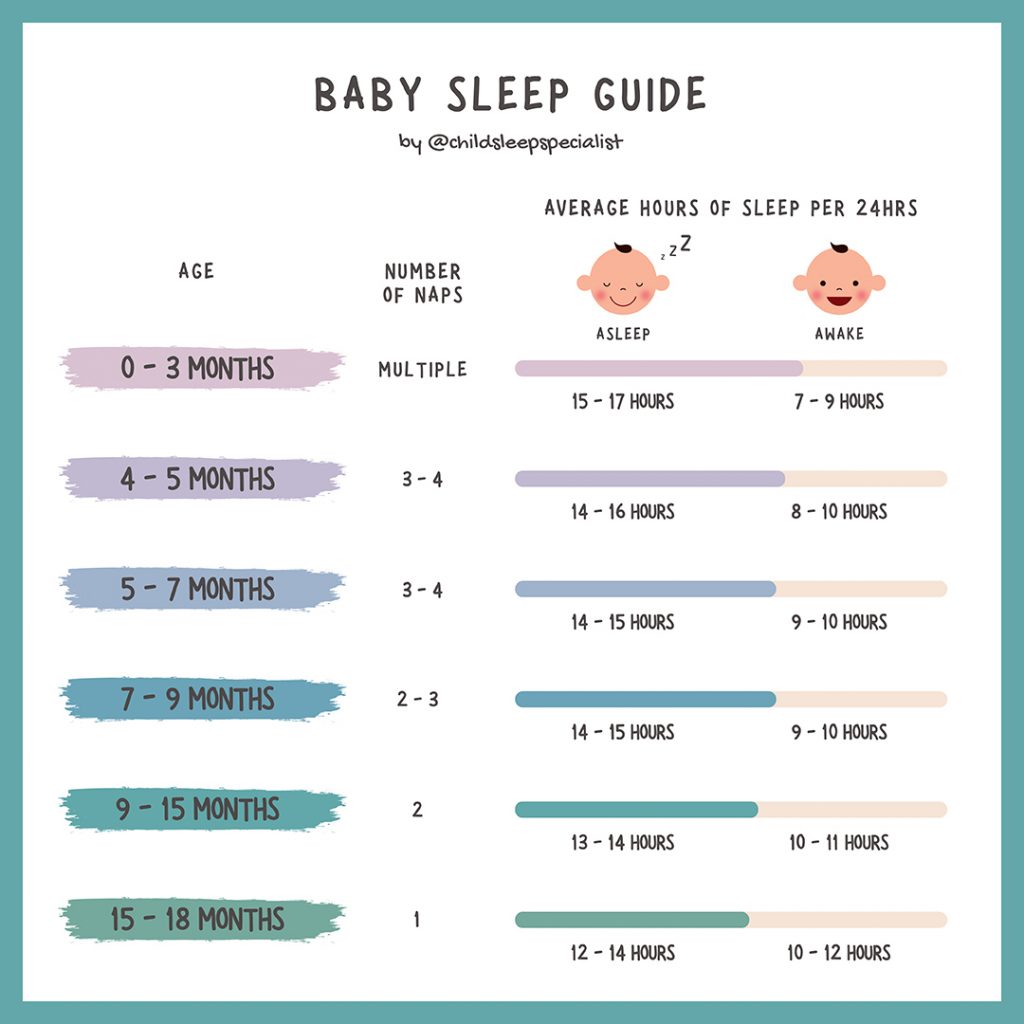
Frequently asked questions
How much sleep does my child need?
Depending on age, your child will need between 10.5-17 hours of sleep in a 24 hour period. This is made up by adding the length of daytime naps (if applicable) and night sleep together.
How much sleep does my baby (0-1 years) need?
Depending on age, most babies will need between 12-17 hours of sleep in a 24 hour period. This is made up by daytime naps and night sleep.
Can they have too much daytime sleep?
After the newborn phase, you may want to consider limiting the nap length to help nighttime sleep. Individual naps can be capped at 2 hours in length.
How Much Sleep Do Premature Babies Need?
For premature babies we work with their adjusted age.
How Does Feeding Affect Sleep for Babies?
Night feeds are incredibly normal. Of course some babies will drop these feeds early, and others will still require a night feed throughout their first year.
When Do Babies Start to Sleep Through the Night?
He he, the age old question! There’s no true answer to this. Often parents can expect to see night feeds dropped around the 7-9 month mark. However this is highly variable based on a range of factors including health, weight, transition onto solids and their ability to settle.
Managing Baby Sleep Pattern Changes
Just as you feel you’re on track it changes again! Try to be led by your little one. If they start to resist bedtime, wake early, or resist naps then it’s probably a sign there are changes on the horizon! Changes can also be influenced by regressions and developmental advances.
Is It Normal For Babies To Take Naps?
Yes absolutely! Most babies will nap on and off in the early days, having no set pattern to their day and night routine. Eventually (between 4-6 months), naps will fall into a more predictable pattern and ‘schedule’.
Most children nap until 3 years of age.
What if my child regularly has trouble falling asleep?
This could be a few things:
- Not tired enough. Try increasing the wake window before bed.
- Too tired! Have they got a sudden extra burst of energy? They could be going into the overtired zone and running on adrenaline. Try decreasing the wake window before bed.
- Not managing the transition between day and night well. Take a look at your bedtime routine. Has it got nice clear steps? This helps children to make the transition and start to wind down for sleep.
- Ready to drop a nap. Perhaps they’re ready to drop the last nap of the day. If they do drop this then you may want to bring bedtime a little earlier during the transition period to help.
If you enjoyed this blog and would like to follow Gemma Coe, baby and child sleep specialist please like and follow Gemma on her Instagram page, @childsleepspecialist, or find more information at: www.childsleepspecialist.co.uk



